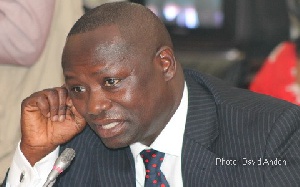- Home - Entertainment
- Lifestyle News
- Entertainment Videos | TV
- Year In Review
- Music News
- Entertainers
- Entertainment Archive
- Entertainment Photos
- Jokes
- Entertainment Headlines
- Ameyaw Debrah
- Brown GH
- Celebrities Buzz
- GH Base
- Ghana Celebrities
- Gh Gossip
- GH Page
- GH Splash
- Hot Gossip GH
- YEN

General News of Monday, 2 February 2015
Source: starrfmonline.com
Revealed: ECG to be privatised by March or June 2016
The Electricity Company of Ghana (ECG) would be privatised by March or June 2016 year depending on the private takeover option the government chooses, according to classified documents intercepted by StarrFMonline.com.
The government of Ghana is considering two privatisation preferences – partial privatisation or a concession contract – as it weighs measures to attract investment in the state-owned power distribution company.
A detailed report by the International Finance Corporation (IFC) for the Government of Ghana, the Millennium Development Corporation and the World Bank, said both options are feasible under the legal framework of Ghana.
In outlining the timelines for the privatisation process, the report titled: Ghana Power Compact Private Sector Participation Options Study for ECG: said by March 2016 the takeover should be completed under the partial privatisation choice.
The process was supposed to have begun in December 2014 with a PSP – Private Sector Participation – option selection, selection of transaction advisor in February 2015, with a privatisation structuring report ready by April 2015.
The transaction advisor is scheduled to deliver a draft Request for Proposals (RFP/Transaction Agreements (Share sales, Shareholders, Implementation) to the GoG by May 2015.
StarrFMonline.com understands that Request for Proposals will be issued to shortlisted bidders by September 2015.
The bidding submission and approval will be done in November 2015 then the “preferred bidder” will be awarded in December this year.
StarrFMonline.com can confirm that after the preferred investor has been chosen, both parties will use between January and March 2016 to complete every paper work.
However, StarrFMonline.com also understands that should the GoG opt for a concession contract instead of partial privatisation, then the final takeover will move forward to June 2016.
With partial privatisation, “the government sells shares in ECG to a private partner and retains partial ownership of the company. While the government will still be a part owner of the company, the private partner will be responsible for operating and managing the company, as well as investing in upgrades critical to improving services,” the highly confidential document stated.
However, with concession, “the Government will enter into an agreement with the private partner where the private partner will have the exclusive right to operate, maintain and carry out investment in ECG for a given number of years. The Private Partner will have the responsibility over the operation and maintenance of all assets and investment during the period, but the government will remain the sole owner of ECG. Once the concession expires, the government will assume total control of the company. The number of years under this concession option is typically around 20 to 30 years.”

The document went on to explain further: “It is important to have a clear understanding of GoG’s principle on “Assets to remain in Government ownership or to have joint ownership through a PPP arrangement”. Two issues stand out which have been discussed with the GoG team: ownership of assets and control over those assets (and control of ECG’s operations). Regarding the ownership of assets the issue is fairly straightforward: under a concession ECG, which is 100% owned by GoG, is the sole owner of all existing assets and the private partner is granted the exclusive right to operate those assets.
“Under partial privatisation, there is joint ownership between GoG and the private partner of ECG, with ECG owning all assets. The control of those assets, and the control over the use of those assets (and the operation of ECG), merits further review. Under either PSP option, GoG may want to have a voice in the operation of ECG, but this needs to be managed responsibly in a predictable and transparent manner...
“Under a concession, control of the assets is passed on to the private partner but ECG as conceding authority retains key monitoring powers as set out in the concession contract. GoG control is largely covered by statute through economic and technical regulation.
Under partial privatisation, GoG control can be exercised by other mechanisms other than ownership: these include a special class of shares, a golden share, and a shareholders’ agreement. The extent of GoG’s powers needs to be well understood and defined as it may have great impact on the success of the PSP option.”











